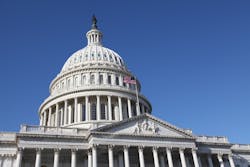Congresswoman on DOT funding bill: ‘Christmas came early for the trucking industry’
The House Appropriations subcommittee charged with setting next year’s budget for the Department of Transportation recommended a plan to the full committee on Wednesday, but ranking Democrats, the administration, and safety groups strongly criticized the bill for setting policy along with spending levels.
“The bill supports key programs that will help make sure our airways and highways are accessible and safe,” Rep. Hal Rogers (R-KY), the Appropriations chairman, said. “This bill strikes an appropriate balance by prioritizing programs that provide critical services to the American public while taking a targeted, thoughtful approach to reducing non-essential or inefficient programs.”
The bill, which also funds the Dept. of Housing and Urban Development and is known as THUD, includes $55.3 billion in discretionary spending. That’s $1.5 billion more than this year’s funding level, but below the $65 billion requested by the White House.
The DOT portion allocates to the Federal Motor Carrier Safety Administration $259 million for operations and $313 million for grants, largely $218 million for the state-administered motor carrier safety assistance program (MCSAP).
But it was the trucking-specific fine print in the bill, or the policy riders, that riled Democrats.
The bill would extend the suspension of the 2013 restart changes to the hours of service rule until the DOT can demonstrate the changes lead to “significant improvement in all outcomes related to safety, operator fatigue, driver health and longevity, and work schedules.”
Among other provisions, the appropriations package also would permit 33-foot pup trailers, up from the current 28-foot limit, and would block any regulation that increases levels of minimum financial responsibility carriers must demonstrate to have DOT operating authority.
“These modifications risk putting the bottom line of the trucking industry above driver safety,” said Rep. David Price (D-NC), ranking member of the transportation subcommittee.
Likewise, Rep. Nita Lowey (D-NY), ranking member of the full committee, argued that such “controversial riders … have no place in an already difficult appropriations process.”
“Christmas came early for the trucking industry,” Lowey said. “We already have enough problems determining funding levels for these important programs. These riders just make that job harder.”
Transportation Secretary Anthony Foxx expressed a similar opinion Tuesday when the draft bill was published, saying that such policy matters should be handled in separate legislation.
"Everyone knows we need to have a reauthorization of the surface system,” Foxx said during a press briefing. “And reauthorization gives you a chance to have the debates, have the discussion, argue both sides and come up a solution that makes sense.”
The Truck Safety Coalition also criticized the process, saying that Congress “continues to push the industry’s agenda” without any public debate and “despite significant public opposition.”
“Truck crash deaths and injuries are up dramatically at the same time Congress is considering major anti-truck safety changes,” the group said in statement. “These safety assaults being pushed in Congress by special trucking interests will increase the safety risks of others including truck drivers, the motoring public, bicyclists and pedestrians.”
A spokesman for American Trucking Assns., however, said the provisions in the THUD package are familiar ones and have been publicly debated in Congress.
"These provisions are not by any means an early Christmas present for trucking, but if enacted into law they will help millions of Americans receive their holiday gifts from a safer and more efficient industry,” ATA’s Sean McNally told Fleet Owner. “ATA will continue to look for legislative opportunities to advance our pro-safety, pro-trucking agenda, whether they are through this bill or other potential long-term transportation bills.”
About the Author
Kevin Jones 1
Editor
Kevin has served as editor-in-chief of Trailer/Body Builders magazine since 2017—just the third editor in the magazine’s 60 years. He is also editorial director for Endeavor Business Media’s Commercial Vehicle group, which includes FleetOwner, Bulk Transporter, Refrigerated Transporter, American Trucker, and Fleet Maintenance magazines and websites.
